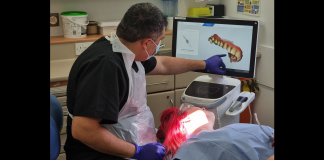A 3D intra-oral scanner and 3D printer is transforming reconstructive surgery for patients in Bradford who have gone through head and neck cancer treatment and major trauma.
Thanks to the new digital 3D intra-oral scanner, funded by Bradford Hospitals Charity, patients now only need a quick five-minute appointment for their teeth and gums to be mapped – replacing multiple lengthy and uncomfortable appointments for dental moulds.
Not only has the number of appointments for patients halved, but the 3D printer can also run 24/7 without clinical intervention, meaning surgery is now faster. Previously, moulds had to be sent to the laboratory for production, with clinical procedures taking several appointments lasting up to 10-12 weeks before construction.
Laura Riach, Bradford Hospitals Charity Director, said: “We are delighted to support the purchase of this digital oral scanner and 3D printer. It is already making a real difference to patients undergoing some of the most complex surgery. This is exactly why charitable giving is so important for our hospitals.”
By producing accurate models, surgeons can also plan and rehearse highly complex procedures in advance, reducing complications, shortening operating times, and helping patients recover more quickly. Patients can also see a model of their treatment beforehand, making their care more transparent and easier to understand.
Mr Ahmed Al-Khayatt, Consultant in Restorative Dentistry and Oral/Facial Rehabilitation, lead of Restorative Dentistry at Bradford Teaching Hospitals NHS Foundation Trust, said: “Before we had this technology, patients often faced multiple uncomfortable appointments to undergo viscous jelly moulds in the mouth that often makes people retch during the 2–5-minute procedure. The moulds are then transferred to our lab that make fragile plaster of paris casts that could break easily, sometimes needing reappointing of patients to undergo the same oral procedures just described.
“We can now provide a much more accurate, faster, and more comfortable experience for our patients which can have endless reuse requiring a fraction of the appointments for patients adding to eco-sustainability and cost-effective material consumption.”
The Maxillofacial Unit, Restorative Dentistry department is now fundraising for another intra-oral and facial scanner, capable of mapping not just the teeth and gums but also the entire head, which would also speed up facial reconstructive surgery.
The 100 Club – a group of 100 key supporters helping deliver exceptional patient care – enjoyed an exclusive behind-the-scenes tour of the unit last week, meeting the clinicians and seeing the equipment their donations support.




